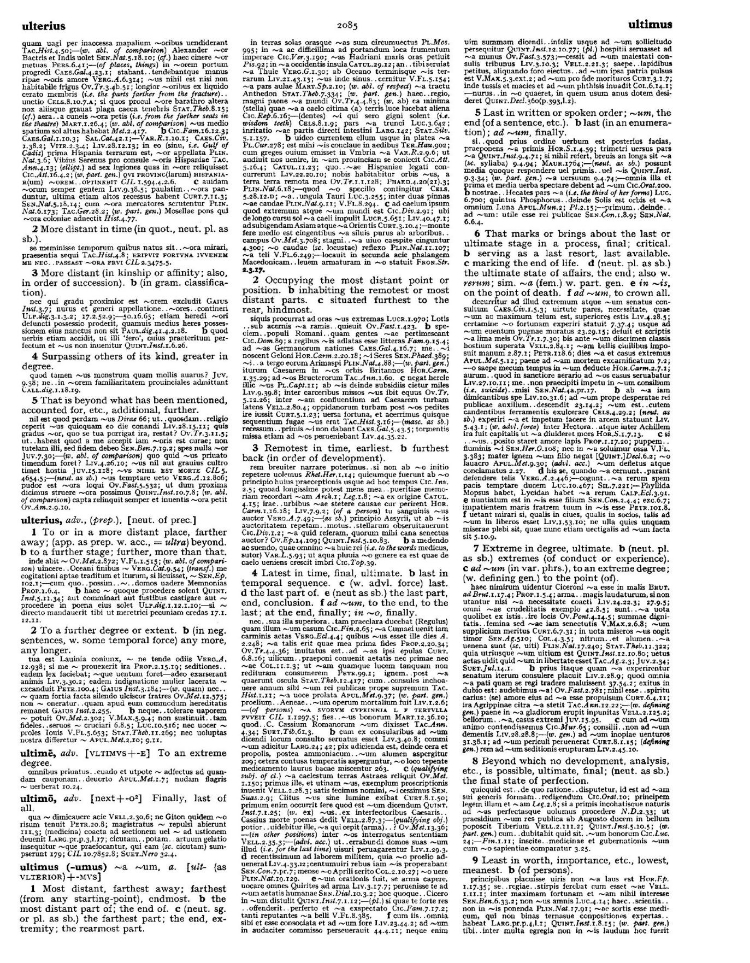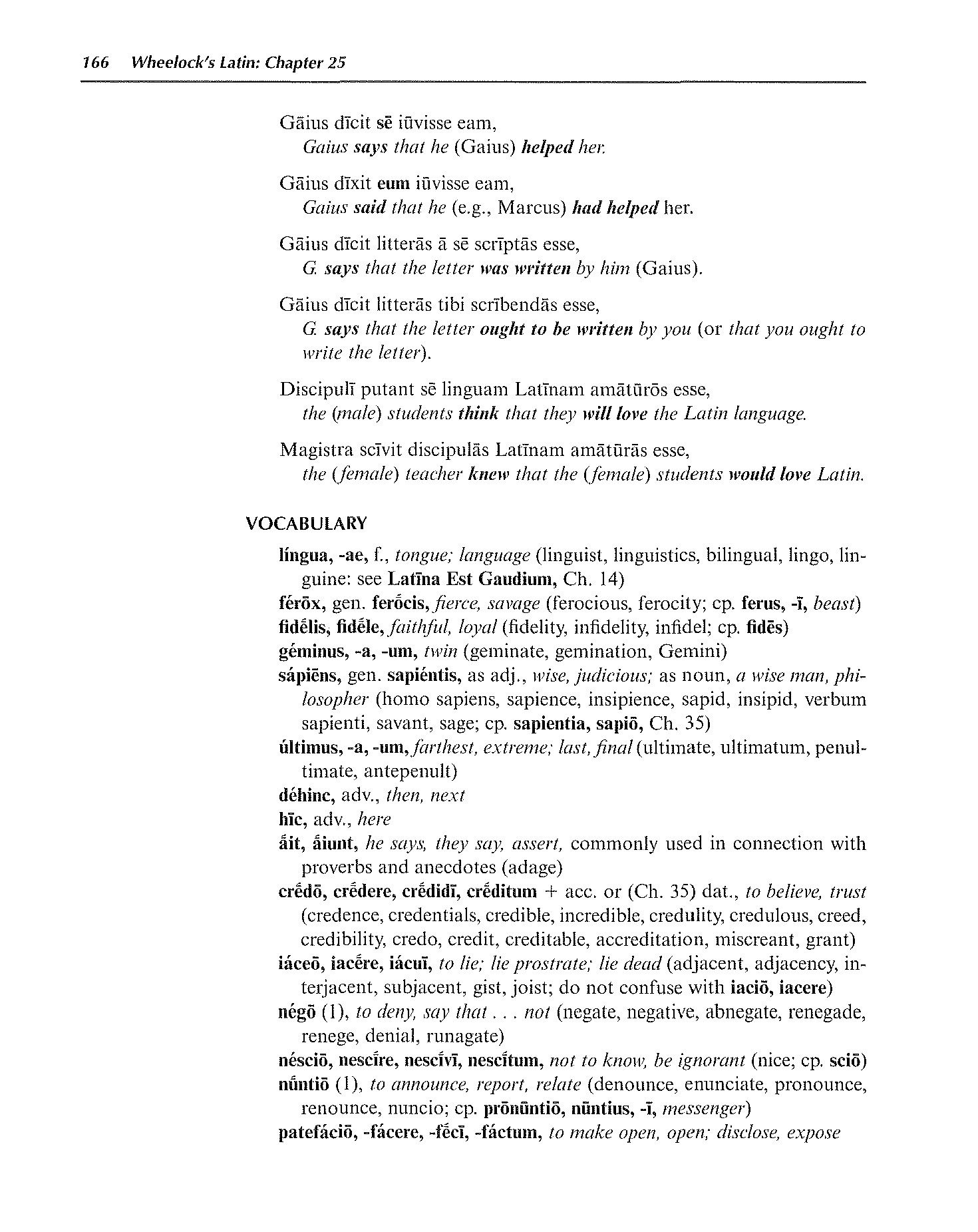
page_listing.tpl
page_subListingDetails.tpl
sub_listingDetails_style1.tpl
sub_listingDetails.title.tpl
ultimus farthest
ultimus is a Latin Adjective that primarily means farthest.
Definitions for ultimus
Wheelock's Latin
Adjective
- 1
farthest, extreme, last, final
English derivatives:
ultimate ultimatum penulmate antepenult
Oxford Latin Dictionary
Adjective
- 1
Most distant, farthest away; farthest (from any starting-point), endmost. (b) the most distant part of; the end of. (c) (neut. sg. or pl. as sb.) the farthest part; the end, extremity; the rearmost part.
- 2
Occupying the most distant point or position. (b) inhabiting the remotest or most distant parts. (c0) situated furthest to the rear, hindmost.
- 3
Remotest in time, earliest. (b) furthest back (in order of development).
- 4
Latest in time, final, ultimate. (b) last in temporal sequence. (c) (w. advl. force) last. (d) the last part of. (e) (neut. as sb.) the last part, end, conclusion. (f) ad ~um, to the end, to the last; at the end, finally; in ~o, finally.
- 5
Last in written or spoken order; ~um, the end (of a sentence, etc.). (b) last (in an enumeration); ad ~um, finally.
Sentences with ultimus
Latin to English
Principibus placuisse viris non ultima laus est. non cuivis homini contigit adire Corinthum.Compare To have found favor with leaders of mankind is not the meanest of glories, It is not everyone that can get to Corinth.
Mors ultima linea rerum est.Compare Death is the limit that ends everything.
Ultima semper expectanda dies homini, dicique beatus ante obitum nemo supremaque funera debet.Compare Man's last day must ever be awaited, and not to be counted happy till his death, till his last funeral rites are paid.
Nec aetas impedio, quominus hic studium teneo usque ad ultimus tempus senectus.Compare Neither do years hinder us from retaining these pursuits even to the extreme limit of old age.
Data sources
Notes
- Definitions
- Frederick M. Wheelock, Wheelock's Latin, 6th ed., rev. Richard A. LaFleur (New York, NY: HarperCollins Publishers, 2005): 166.
- P. G. W. Glare, Oxford Latin Dictionary, Vols. 1-8 (Oxford: Clarendon Press, 1982): 2085.
- Word frequencies
- Christopher Francese, "Latin Core Vocabulary," Dickinson College Commentaries, last modified 2014, http://dcc.dickinson.edu.
- Paul B. Diederich, The Frequency of Latin Words and Their Endings, PhD diss., (Columbia University, 1939).
- Louis Delatte, Suzanne Govaerts, Joseph Denooz, and Etienne Evrard, Dictionnaire fréquentiel et index inverse de la langue latine [Frequency Dictionary and Inverse Index of the Latin Language] (Liège, Belgium: Laboratoire d'analyse statistique des langues anciennes de l'Université de Liège [L.A.S.L.A.], 1981): 122.
Bibliography
Allen, Joseph H. Allen and Greenough's New Latin Grammar for Schools and Colleges: Founded on Comparative Grammar. Edited by James B. Greenough, George L. Kittredge, Albert A. Howard, and Benjamin L. D'Ooge. Boston, MA: Ginn & Company, 1903.
Crystal, David. A Dictionary of Linguistics and Phonetics. 6th ed. Oxford, UK: Blackwell Publishing, 2008.
Delatte, Louis, Suzanne Govaerts, Joseph Denooz, and Etienne Evrard. Dictionnaire fréquentiel et index inverse de la langue latine [Frequency Dictionary and Inverse Index of the Latin Language]. Liège, Belgium: Laboratoire d'analyse statistique des langues anciennes de l'Université de Liège (L.A.S.L.A.), 1981.
Diederich, Paul B. The Frequency of Latin Words and Their Endings. PhD diss., Columbia University, 1939.
Francese, Christopher. "Latin Core Vocabulary." Dickinson College Commentaries. Last modified 2014. http://dcc.dickinson.edu/latin-vocabulary-list.
Gildersleeve, Basil L., and Gonzales Lodge. Gildersleeve's Latin Grammar: Third Edition, Revised, and Enlarged. 3rd ed. London, England: Macmillan and Co., 1903.
Glare, Peter G.W. Oxford Latin Dictionary. Vols. 1-8. Oxford, England: Clarendon Press, 1982.
Krüger, Bernd. "Latin Conjugation Tables." Cactus2000. Accessed May 5, 2023. https://latin.cactus2000.de/index.en.php.
Pierson, Nick. "Sound of Text." Accessed October 26, 2019. https://soundoftext.com.
Wheelock, Frederick M. Wheelock's Latin. 6th ed. Revised by Richard A. LaFleur. New York, NY: HarperCollins Publishers, 2005.
Wiktionary Contributors. "Victionarium." Wikimedia Foundation, Inc. Updated March 18, 2019. https://la.wiktionary.org/wiki/Victionarium:Pagina_prima.
Citation
Chicago (17th ed.)
Allo Contributors. "ultimus, ultima, ultimum (adj.) - Latin Word Definition." Allo Latin Dictionary. Last modified . Accessed February 20, 2026. http://ancientlanguages.org/latin/dictionary/ultimus-ultima-ultimum.
Entry created on . Last updated on .







